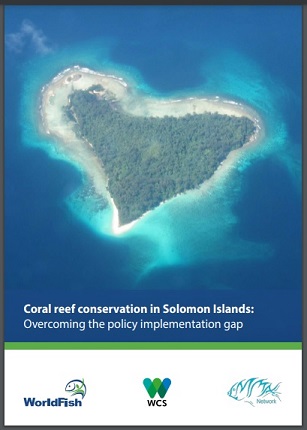
This policy gap analysis identifies threats to coral reefs, evaluates the effectiveness of the existing legal framework to address these threats, and formulates recommendations to strengthen community-based natural resource management in Solomon Islands. Coral reefs are of crucial importance for food security and rural livelihoods in the archipelago. Logging is a major, yet often overlooked, threat to coral reefs in the country. Large-scale logging operations cause massive erosion, which has a detrimental effect on water quality. The shipping accidents, oil pollution and uncontrolled construction of log ponds associated with the logging industry also have a significant impact on coastal ecosystems. Overfishing is particularly problematic on narrow fringe reefs in densely populated areas, such as the northwest coast of Malaita and the west coast of Guadalcanal. Nonetheless, coral reefs in Solomon Islands remain in fairly good condition and seem relatively resilient to global climate change impacts. The existing legal framework is in principle adequate to address current threats to coral reefs. The key challenge is to enforce these laws on the ground. But provincial governments, which play a pivotal role in implementing environmental legislation, remain structurally under-resourced. Civil society organizations, government agencies and donors are actively promoting community-based resource management (CBRM), and substantial efforts have been made over the past 20 years to build an enabling policy framework to support conservation action at the grassroots level. However, these initiatives have little impact on wider development trajectories in the country. In most cases, customary authorities are unable to address supra-local threats, such as logginginduced sedimentation, shipping accidents or the harvesting of marine resources for export markets. Only government agencies can effectively address these threats.














